Analyzing Mrs. B's Affective Disorder: A Mental Health Nursing Report
VerifiedAdded on 2023/01/06
|8
|2278
|76
Report
AI Summary
This report provides a detailed analysis of a mental health nursing case study involving a patient, Mrs. B, diagnosed with an affective disorder. The report explores the communication techniques employed by the interviewer to facilitate engagement and understanding, highlighting their effectiveness. It delves into the features of a major depressive episode with psychotic features, as observed in the patient's presentation, including the medications prescribed. The report also examines the communication skills nurses can use to therapeutically address the patient's delusional beliefs, the reasons behind her reluctance to eat, and the interventions nurses might employ to improve her sleep pattern. The analysis covers the use of supportive techniques, problem-solving approaches, and assistance with self-care, emphasizing the importance of effective communication and tailored interventions to improve the patient's mental and physical well-being. The report also includes relevant references to support the findings and recommendations.
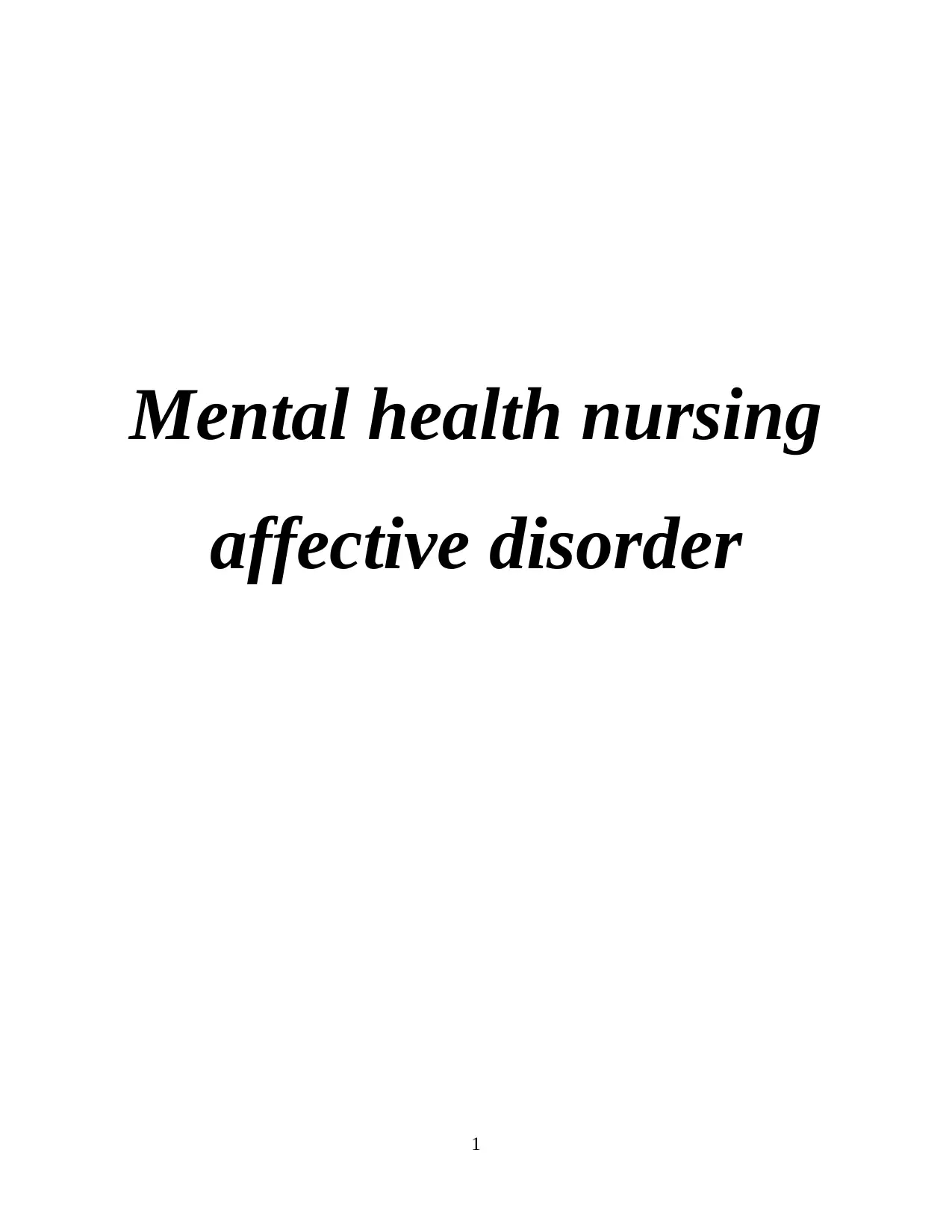
Mental health nursing
affective disorder
1
affective disorder
1
Paraphrase This Document
Need a fresh take? Get an instant paraphrase of this document with our AI Paraphraser
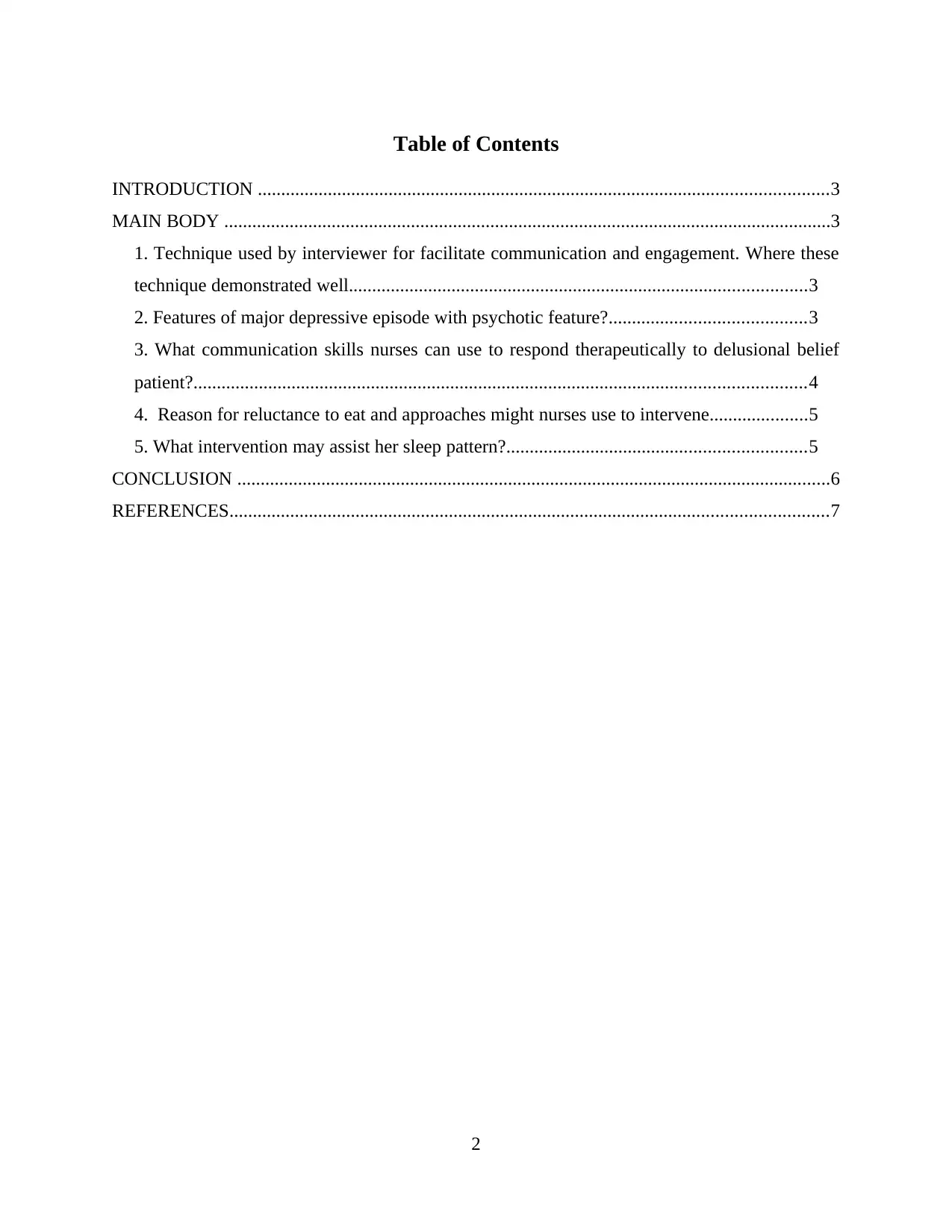
Table of Contents
INTRODUCTION ..........................................................................................................................3
MAIN BODY ..................................................................................................................................3
1. Technique used by interviewer for facilitate communication and engagement. Where these
technique demonstrated well..................................................................................................3
2. Features of major depressive episode with psychotic feature?..........................................3
3. What communication skills nurses can use to respond therapeutically to delusional belief
patient?...................................................................................................................................4
4. Reason for reluctance to eat and approaches might nurses use to intervene.....................5
5. What intervention may assist her sleep pattern?................................................................5
CONCLUSION ...............................................................................................................................6
REFERENCES................................................................................................................................7
2
INTRODUCTION ..........................................................................................................................3
MAIN BODY ..................................................................................................................................3
1. Technique used by interviewer for facilitate communication and engagement. Where these
technique demonstrated well..................................................................................................3
2. Features of major depressive episode with psychotic feature?..........................................3
3. What communication skills nurses can use to respond therapeutically to delusional belief
patient?...................................................................................................................................4
4. Reason for reluctance to eat and approaches might nurses use to intervene.....................5
5. What intervention may assist her sleep pattern?................................................................5
CONCLUSION ...............................................................................................................................6
REFERENCES................................................................................................................................7
2
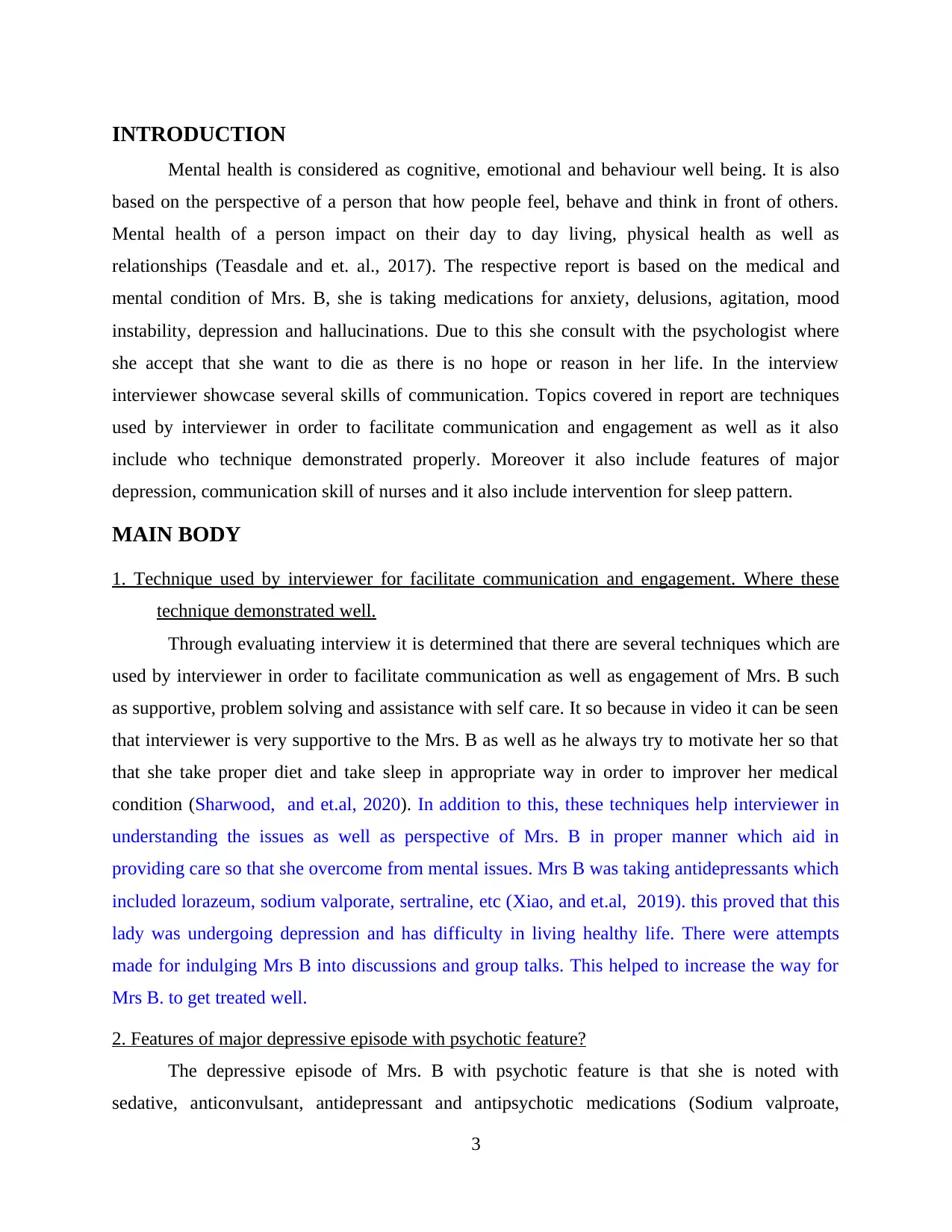
INTRODUCTION
Mental health is considered as cognitive, emotional and behaviour well being. It is also
based on the perspective of a person that how people feel, behave and think in front of others.
Mental health of a person impact on their day to day living, physical health as well as
relationships (Teasdale and et. al., 2017). The respective report is based on the medical and
mental condition of Mrs. B, she is taking medications for anxiety, delusions, agitation, mood
instability, depression and hallucinations. Due to this she consult with the psychologist where
she accept that she want to die as there is no hope or reason in her life. In the interview
interviewer showcase several skills of communication. Topics covered in report are techniques
used by interviewer in order to facilitate communication and engagement as well as it also
include who technique demonstrated properly. Moreover it also include features of major
depression, communication skill of nurses and it also include intervention for sleep pattern.
MAIN BODY
1. Technique used by interviewer for facilitate communication and engagement. Where these
technique demonstrated well.
Through evaluating interview it is determined that there are several techniques which are
used by interviewer in order to facilitate communication as well as engagement of Mrs. B such
as supportive, problem solving and assistance with self care. It so because in video it can be seen
that interviewer is very supportive to the Mrs. B as well as he always try to motivate her so that
that she take proper diet and take sleep in appropriate way in order to improver her medical
condition (Sharwood, and et.al, 2020). In addition to this, these techniques help interviewer in
understanding the issues as well as perspective of Mrs. B in proper manner which aid in
providing care so that she overcome from mental issues. Mrs B was taking antidepressants which
included lorazeum, sodium valporate, sertraline, etc (Xiao, and et.al, 2019). this proved that this
lady was undergoing depression and has difficulty in living healthy life. There were attempts
made for indulging Mrs B into discussions and group talks. This helped to increase the way for
Mrs B. to get treated well.
2. Features of major depressive episode with psychotic feature?
The depressive episode of Mrs. B with psychotic feature is that she is noted with
sedative, anticonvulsant, antidepressant and antipsychotic medications (Sodium valproate,
3
Mental health is considered as cognitive, emotional and behaviour well being. It is also
based on the perspective of a person that how people feel, behave and think in front of others.
Mental health of a person impact on their day to day living, physical health as well as
relationships (Teasdale and et. al., 2017). The respective report is based on the medical and
mental condition of Mrs. B, she is taking medications for anxiety, delusions, agitation, mood
instability, depression and hallucinations. Due to this she consult with the psychologist where
she accept that she want to die as there is no hope or reason in her life. In the interview
interviewer showcase several skills of communication. Topics covered in report are techniques
used by interviewer in order to facilitate communication and engagement as well as it also
include who technique demonstrated properly. Moreover it also include features of major
depression, communication skill of nurses and it also include intervention for sleep pattern.
MAIN BODY
1. Technique used by interviewer for facilitate communication and engagement. Where these
technique demonstrated well.
Through evaluating interview it is determined that there are several techniques which are
used by interviewer in order to facilitate communication as well as engagement of Mrs. B such
as supportive, problem solving and assistance with self care. It so because in video it can be seen
that interviewer is very supportive to the Mrs. B as well as he always try to motivate her so that
that she take proper diet and take sleep in appropriate way in order to improver her medical
condition (Sharwood, and et.al, 2020). In addition to this, these techniques help interviewer in
understanding the issues as well as perspective of Mrs. B in proper manner which aid in
providing care so that she overcome from mental issues. Mrs B was taking antidepressants which
included lorazeum, sodium valporate, sertraline, etc (Xiao, and et.al, 2019). this proved that this
lady was undergoing depression and has difficulty in living healthy life. There were attempts
made for indulging Mrs B into discussions and group talks. This helped to increase the way for
Mrs B. to get treated well.
2. Features of major depressive episode with psychotic feature?
The depressive episode of Mrs. B with psychotic feature is that she is noted with
sedative, anticonvulsant, antidepressant and antipsychotic medications (Sodium valproate,
3
⊘ This is a preview!⊘
Do you want full access?
Subscribe today to unlock all pages.

Trusted by 1+ million students worldwide
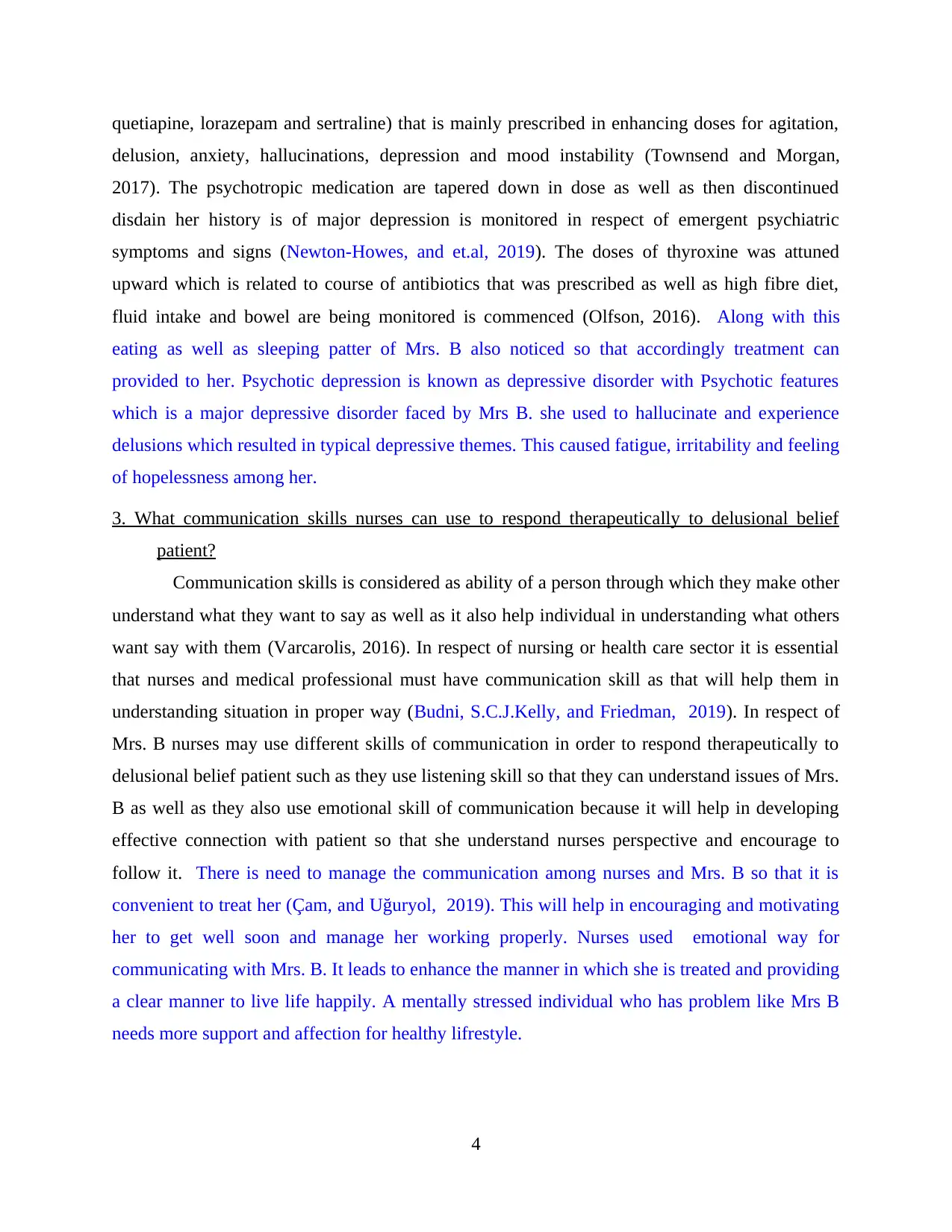
quetiapine, lorazepam and sertraline) that is mainly prescribed in enhancing doses for agitation,
delusion, anxiety, hallucinations, depression and mood instability (Townsend and Morgan,
2017). The psychotropic medication are tapered down in dose as well as then discontinued
disdain her history is of major depression is monitored in respect of emergent psychiatric
symptoms and signs (Newton-Howes, and et.al, 2019). The doses of thyroxine was attuned
upward which is related to course of antibiotics that was prescribed as well as high fibre diet,
fluid intake and bowel are being monitored is commenced (Olfson, 2016). Along with this
eating as well as sleeping patter of Mrs. B also noticed so that accordingly treatment can
provided to her. Psychotic depression is known as depressive disorder with Psychotic features
which is a major depressive disorder faced by Mrs B. she used to hallucinate and experience
delusions which resulted in typical depressive themes. This caused fatigue, irritability and feeling
of hopelessness among her.
3. What communication skills nurses can use to respond therapeutically to delusional belief
patient?
Communication skills is considered as ability of a person through which they make other
understand what they want to say as well as it also help individual in understanding what others
want say with them (Varcarolis, 2016). In respect of nursing or health care sector it is essential
that nurses and medical professional must have communication skill as that will help them in
understanding situation in proper way (Budni, S.C.J.Kelly, and Friedman, 2019). In respect of
Mrs. B nurses may use different skills of communication in order to respond therapeutically to
delusional belief patient such as they use listening skill so that they can understand issues of Mrs.
B as well as they also use emotional skill of communication because it will help in developing
effective connection with patient so that she understand nurses perspective and encourage to
follow it. There is need to manage the communication among nurses and Mrs. B so that it is
convenient to treat her (Çam, and Uğuryol, 2019). This will help in encouraging and motivating
her to get well soon and manage her working properly. Nurses used emotional way for
communicating with Mrs. B. It leads to enhance the manner in which she is treated and providing
a clear manner to live life happily. A mentally stressed individual who has problem like Mrs B
needs more support and affection for healthy lifrestyle.
4
delusion, anxiety, hallucinations, depression and mood instability (Townsend and Morgan,
2017). The psychotropic medication are tapered down in dose as well as then discontinued
disdain her history is of major depression is monitored in respect of emergent psychiatric
symptoms and signs (Newton-Howes, and et.al, 2019). The doses of thyroxine was attuned
upward which is related to course of antibiotics that was prescribed as well as high fibre diet,
fluid intake and bowel are being monitored is commenced (Olfson, 2016). Along with this
eating as well as sleeping patter of Mrs. B also noticed so that accordingly treatment can
provided to her. Psychotic depression is known as depressive disorder with Psychotic features
which is a major depressive disorder faced by Mrs B. she used to hallucinate and experience
delusions which resulted in typical depressive themes. This caused fatigue, irritability and feeling
of hopelessness among her.
3. What communication skills nurses can use to respond therapeutically to delusional belief
patient?
Communication skills is considered as ability of a person through which they make other
understand what they want to say as well as it also help individual in understanding what others
want say with them (Varcarolis, 2016). In respect of nursing or health care sector it is essential
that nurses and medical professional must have communication skill as that will help them in
understanding situation in proper way (Budni, S.C.J.Kelly, and Friedman, 2019). In respect of
Mrs. B nurses may use different skills of communication in order to respond therapeutically to
delusional belief patient such as they use listening skill so that they can understand issues of Mrs.
B as well as they also use emotional skill of communication because it will help in developing
effective connection with patient so that she understand nurses perspective and encourage to
follow it. There is need to manage the communication among nurses and Mrs. B so that it is
convenient to treat her (Çam, and Uğuryol, 2019). This will help in encouraging and motivating
her to get well soon and manage her working properly. Nurses used emotional way for
communicating with Mrs. B. It leads to enhance the manner in which she is treated and providing
a clear manner to live life happily. A mentally stressed individual who has problem like Mrs B
needs more support and affection for healthy lifrestyle.
4
Paraphrase This Document
Need a fresh take? Get an instant paraphrase of this document with our AI Paraphraser
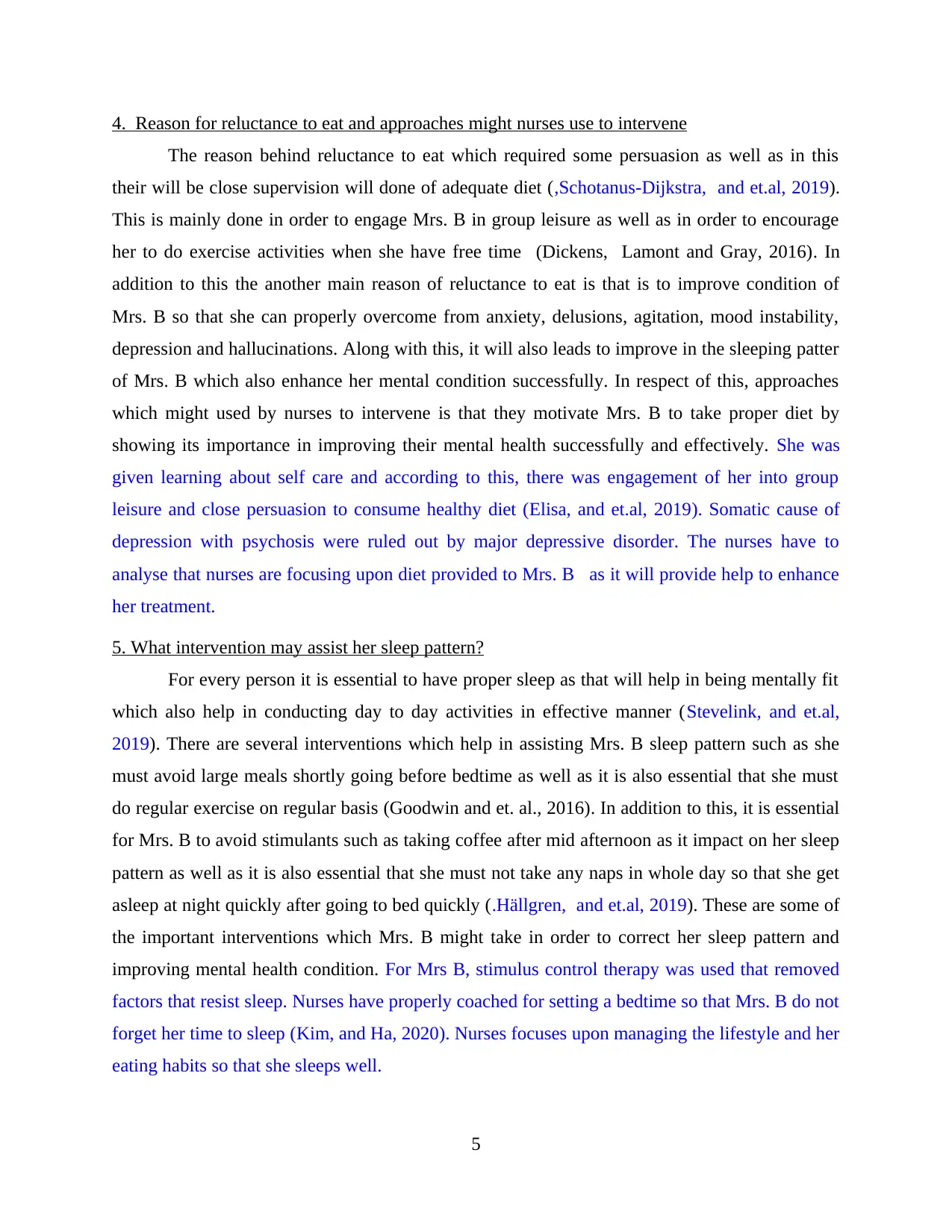
4. Reason for reluctance to eat and approaches might nurses use to intervene
The reason behind reluctance to eat which required some persuasion as well as in this
their will be close supervision will done of adequate diet (,Schotanus-Dijkstra, and et.al, 2019).
This is mainly done in order to engage Mrs. B in group leisure as well as in order to encourage
her to do exercise activities when she have free time (Dickens, Lamont and Gray, 2016). In
addition to this the another main reason of reluctance to eat is that is to improve condition of
Mrs. B so that she can properly overcome from anxiety, delusions, agitation, mood instability,
depression and hallucinations. Along with this, it will also leads to improve in the sleeping patter
of Mrs. B which also enhance her mental condition successfully. In respect of this, approaches
which might used by nurses to intervene is that they motivate Mrs. B to take proper diet by
showing its importance in improving their mental health successfully and effectively. She was
given learning about self care and according to this, there was engagement of her into group
leisure and close persuasion to consume healthy diet (Elisa, and et.al, 2019). Somatic cause of
depression with psychosis were ruled out by major depressive disorder. The nurses have to
analyse that nurses are focusing upon diet provided to Mrs. B as it will provide help to enhance
her treatment.
5. What intervention may assist her sleep pattern?
For every person it is essential to have proper sleep as that will help in being mentally fit
which also help in conducting day to day activities in effective manner (Stevelink, and et.al,
2019). There are several interventions which help in assisting Mrs. B sleep pattern such as she
must avoid large meals shortly going before bedtime as well as it is also essential that she must
do regular exercise on regular basis (Goodwin and et. al., 2016). In addition to this, it is essential
for Mrs. B to avoid stimulants such as taking coffee after mid afternoon as it impact on her sleep
pattern as well as it is also essential that she must not take any naps in whole day so that she get
asleep at night quickly after going to bed quickly (.Hällgren, and et.al, 2019). These are some of
the important interventions which Mrs. B might take in order to correct her sleep pattern and
improving mental health condition. For Mrs B, stimulus control therapy was used that removed
factors that resist sleep. Nurses have properly coached for setting a bedtime so that Mrs. B do not
forget her time to sleep (Kim, and Ha, 2020). Nurses focuses upon managing the lifestyle and her
eating habits so that she sleeps well.
5
The reason behind reluctance to eat which required some persuasion as well as in this
their will be close supervision will done of adequate diet (,Schotanus-Dijkstra, and et.al, 2019).
This is mainly done in order to engage Mrs. B in group leisure as well as in order to encourage
her to do exercise activities when she have free time (Dickens, Lamont and Gray, 2016). In
addition to this the another main reason of reluctance to eat is that is to improve condition of
Mrs. B so that she can properly overcome from anxiety, delusions, agitation, mood instability,
depression and hallucinations. Along with this, it will also leads to improve in the sleeping patter
of Mrs. B which also enhance her mental condition successfully. In respect of this, approaches
which might used by nurses to intervene is that they motivate Mrs. B to take proper diet by
showing its importance in improving their mental health successfully and effectively. She was
given learning about self care and according to this, there was engagement of her into group
leisure and close persuasion to consume healthy diet (Elisa, and et.al, 2019). Somatic cause of
depression with psychosis were ruled out by major depressive disorder. The nurses have to
analyse that nurses are focusing upon diet provided to Mrs. B as it will provide help to enhance
her treatment.
5. What intervention may assist her sleep pattern?
For every person it is essential to have proper sleep as that will help in being mentally fit
which also help in conducting day to day activities in effective manner (Stevelink, and et.al,
2019). There are several interventions which help in assisting Mrs. B sleep pattern such as she
must avoid large meals shortly going before bedtime as well as it is also essential that she must
do regular exercise on regular basis (Goodwin and et. al., 2016). In addition to this, it is essential
for Mrs. B to avoid stimulants such as taking coffee after mid afternoon as it impact on her sleep
pattern as well as it is also essential that she must not take any naps in whole day so that she get
asleep at night quickly after going to bed quickly (.Hällgren, and et.al, 2019). These are some of
the important interventions which Mrs. B might take in order to correct her sleep pattern and
improving mental health condition. For Mrs B, stimulus control therapy was used that removed
factors that resist sleep. Nurses have properly coached for setting a bedtime so that Mrs. B do not
forget her time to sleep (Kim, and Ha, 2020). Nurses focuses upon managing the lifestyle and her
eating habits so that she sleeps well.
5
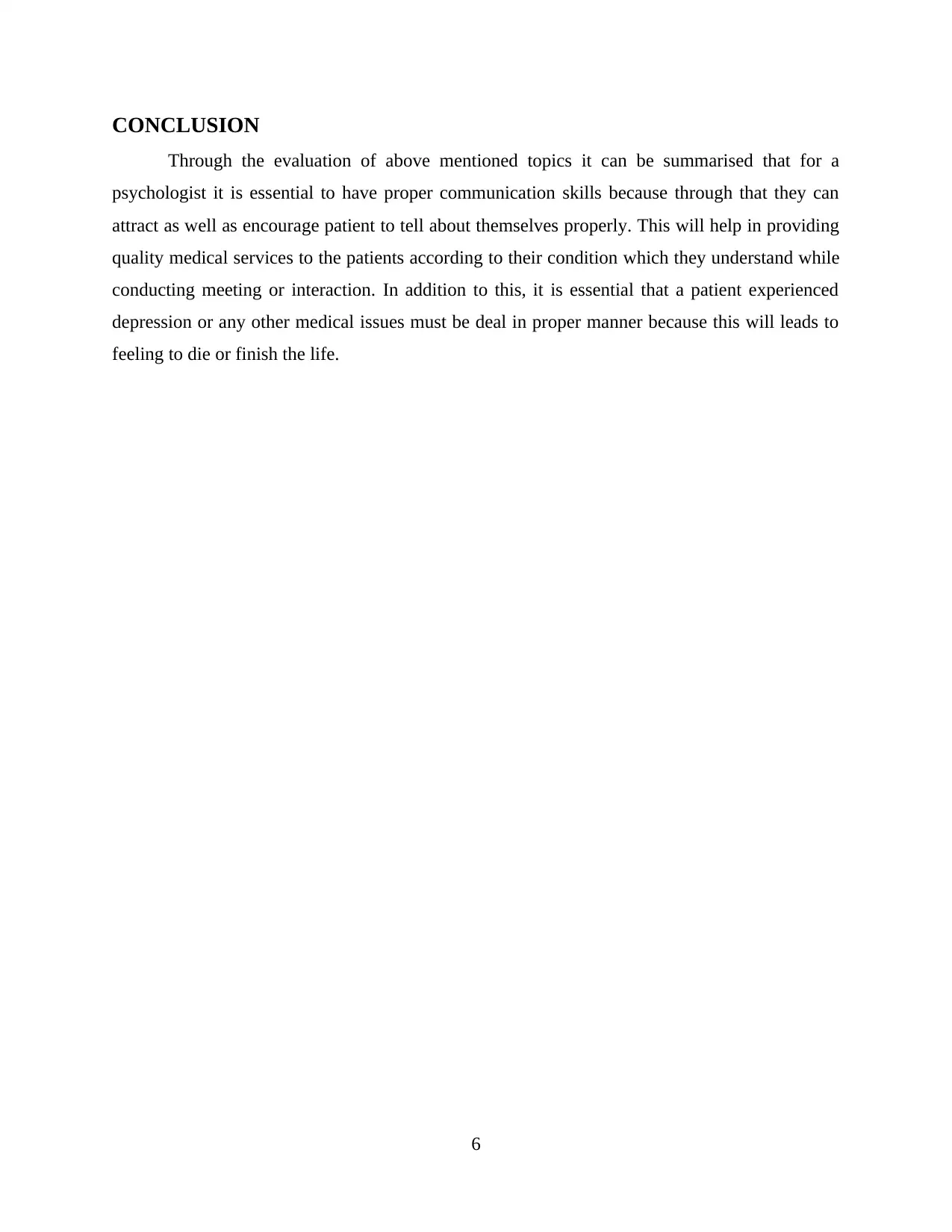
CONCLUSION
Through the evaluation of above mentioned topics it can be summarised that for a
psychologist it is essential to have proper communication skills because through that they can
attract as well as encourage patient to tell about themselves properly. This will help in providing
quality medical services to the patients according to their condition which they understand while
conducting meeting or interaction. In addition to this, it is essential that a patient experienced
depression or any other medical issues must be deal in proper manner because this will leads to
feeling to die or finish the life.
6
Through the evaluation of above mentioned topics it can be summarised that for a
psychologist it is essential to have proper communication skills because through that they can
attract as well as encourage patient to tell about themselves properly. This will help in providing
quality medical services to the patients according to their condition which they understand while
conducting meeting or interaction. In addition to this, it is essential that a patient experienced
depression or any other medical issues must be deal in proper manner because this will leads to
feeling to die or finish the life.
6
⊘ This is a preview!⊘
Do you want full access?
Subscribe today to unlock all pages.

Trusted by 1+ million students worldwide
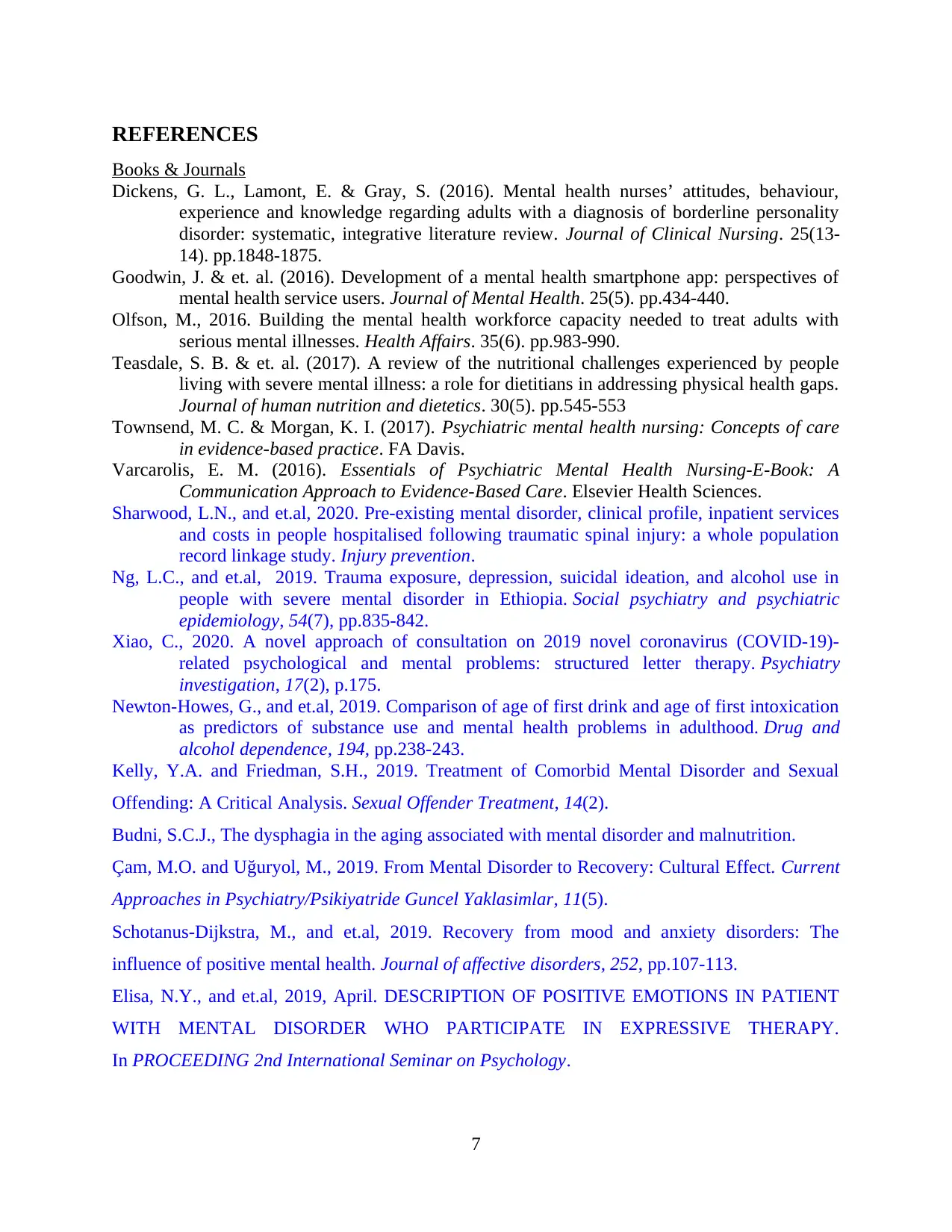
REFERENCES
Books & Journals
Dickens, G. L., Lamont, E. & Gray, S. (2016). Mental health nurses’ attitudes, behaviour,
experience and knowledge regarding adults with a diagnosis of borderline personality
disorder: systematic, integrative literature review. Journal of Clinical Nursing. 25(13-
14). pp.1848-1875.
Goodwin, J. & et. al. (2016). Development of a mental health smartphone app: perspectives of
mental health service users. Journal of Mental Health. 25(5). pp.434-440.
Olfson, M., 2016. Building the mental health workforce capacity needed to treat adults with
serious mental illnesses. Health Affairs. 35(6). pp.983-990.
Teasdale, S. B. & et. al. (2017). A review of the nutritional challenges experienced by people
living with severe mental illness: a role for dietitians in addressing physical health gaps.
Journal of human nutrition and dietetics. 30(5). pp.545-553
Townsend, M. C. & Morgan, K. I. (2017). Psychiatric mental health nursing: Concepts of care
in evidence-based practice. FA Davis.
Varcarolis, E. M. (2016). Essentials of Psychiatric Mental Health Nursing-E-Book: A
Communication Approach to Evidence-Based Care. Elsevier Health Sciences.
Sharwood, L.N., and et.al, 2020. Pre-existing mental disorder, clinical profile, inpatient services
and costs in people hospitalised following traumatic spinal injury: a whole population
record linkage study. Injury prevention.
Ng, L.C., and et.al, 2019. Trauma exposure, depression, suicidal ideation, and alcohol use in
people with severe mental disorder in Ethiopia. Social psychiatry and psychiatric
epidemiology, 54(7), pp.835-842.
Xiao, C., 2020. A novel approach of consultation on 2019 novel coronavirus (COVID-19)-
related psychological and mental problems: structured letter therapy. Psychiatry
investigation, 17(2), p.175.
Newton-Howes, G., and et.al, 2019. Comparison of age of first drink and age of first intoxication
as predictors of substance use and mental health problems in adulthood. Drug and
alcohol dependence, 194, pp.238-243.
Kelly, Y.A. and Friedman, S.H., 2019. Treatment of Comorbid Mental Disorder and Sexual
Offending: A Critical Analysis. Sexual Offender Treatment, 14(2).
Budni, S.C.J., The dysphagia in the aging associated with mental disorder and malnutrition.
Çam, M.O. and Uğuryol, M., 2019. From Mental Disorder to Recovery: Cultural Effect. Current
Approaches in Psychiatry/Psikiyatride Guncel Yaklasimlar, 11(5).
Schotanus-Dijkstra, M., and et.al, 2019. Recovery from mood and anxiety disorders: The
influence of positive mental health. Journal of affective disorders, 252, pp.107-113.
Elisa, N.Y., and et.al, 2019, April. DESCRIPTION OF POSITIVE EMOTIONS IN PATIENT
WITH MENTAL DISORDER WHO PARTICIPATE IN EXPRESSIVE THERAPY.
In PROCEEDING 2nd International Seminar on Psychology.
7
Books & Journals
Dickens, G. L., Lamont, E. & Gray, S. (2016). Mental health nurses’ attitudes, behaviour,
experience and knowledge regarding adults with a diagnosis of borderline personality
disorder: systematic, integrative literature review. Journal of Clinical Nursing. 25(13-
14). pp.1848-1875.
Goodwin, J. & et. al. (2016). Development of a mental health smartphone app: perspectives of
mental health service users. Journal of Mental Health. 25(5). pp.434-440.
Olfson, M., 2016. Building the mental health workforce capacity needed to treat adults with
serious mental illnesses. Health Affairs. 35(6). pp.983-990.
Teasdale, S. B. & et. al. (2017). A review of the nutritional challenges experienced by people
living with severe mental illness: a role for dietitians in addressing physical health gaps.
Journal of human nutrition and dietetics. 30(5). pp.545-553
Townsend, M. C. & Morgan, K. I. (2017). Psychiatric mental health nursing: Concepts of care
in evidence-based practice. FA Davis.
Varcarolis, E. M. (2016). Essentials of Psychiatric Mental Health Nursing-E-Book: A
Communication Approach to Evidence-Based Care. Elsevier Health Sciences.
Sharwood, L.N., and et.al, 2020. Pre-existing mental disorder, clinical profile, inpatient services
and costs in people hospitalised following traumatic spinal injury: a whole population
record linkage study. Injury prevention.
Ng, L.C., and et.al, 2019. Trauma exposure, depression, suicidal ideation, and alcohol use in
people with severe mental disorder in Ethiopia. Social psychiatry and psychiatric
epidemiology, 54(7), pp.835-842.
Xiao, C., 2020. A novel approach of consultation on 2019 novel coronavirus (COVID-19)-
related psychological and mental problems: structured letter therapy. Psychiatry
investigation, 17(2), p.175.
Newton-Howes, G., and et.al, 2019. Comparison of age of first drink and age of first intoxication
as predictors of substance use and mental health problems in adulthood. Drug and
alcohol dependence, 194, pp.238-243.
Kelly, Y.A. and Friedman, S.H., 2019. Treatment of Comorbid Mental Disorder and Sexual
Offending: A Critical Analysis. Sexual Offender Treatment, 14(2).
Budni, S.C.J., The dysphagia in the aging associated with mental disorder and malnutrition.
Çam, M.O. and Uğuryol, M., 2019. From Mental Disorder to Recovery: Cultural Effect. Current
Approaches in Psychiatry/Psikiyatride Guncel Yaklasimlar, 11(5).
Schotanus-Dijkstra, M., and et.al, 2019. Recovery from mood and anxiety disorders: The
influence of positive mental health. Journal of affective disorders, 252, pp.107-113.
Elisa, N.Y., and et.al, 2019, April. DESCRIPTION OF POSITIVE EMOTIONS IN PATIENT
WITH MENTAL DISORDER WHO PARTICIPATE IN EXPRESSIVE THERAPY.
In PROCEEDING 2nd International Seminar on Psychology.
7
Paraphrase This Document
Need a fresh take? Get an instant paraphrase of this document with our AI Paraphraser
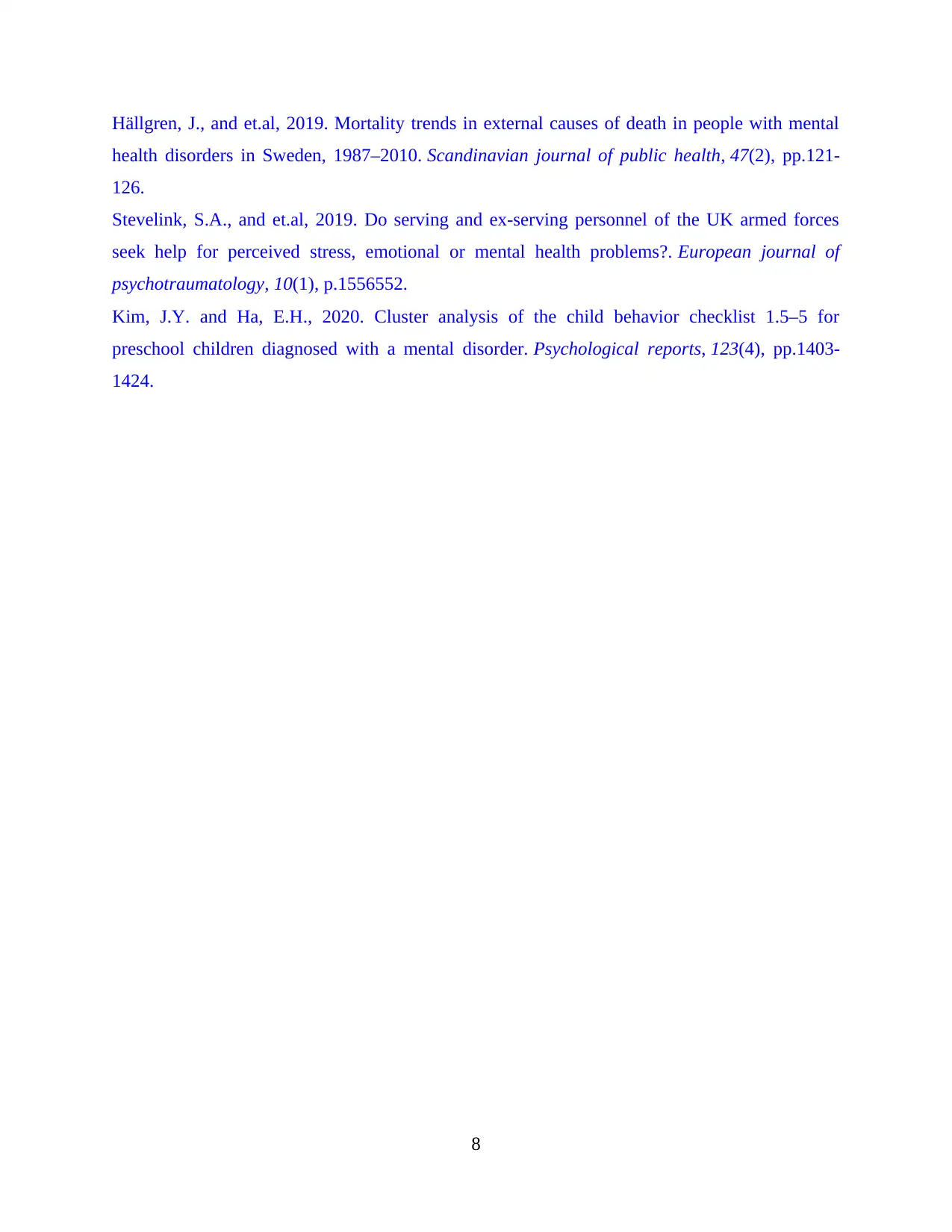
Hällgren, J., and et.al, 2019. Mortality trends in external causes of death in people with mental
health disorders in Sweden, 1987–2010. Scandinavian journal of public health, 47(2), pp.121-
126.
Stevelink, S.A., and et.al, 2019. Do serving and ex-serving personnel of the UK armed forces
seek help for perceived stress, emotional or mental health problems?. European journal of
psychotraumatology, 10(1), p.1556552.
Kim, J.Y. and Ha, E.H., 2020. Cluster analysis of the child behavior checklist 1.5–5 for
preschool children diagnosed with a mental disorder. Psychological reports, 123(4), pp.1403-
1424.
8
health disorders in Sweden, 1987–2010. Scandinavian journal of public health, 47(2), pp.121-
126.
Stevelink, S.A., and et.al, 2019. Do serving and ex-serving personnel of the UK armed forces
seek help for perceived stress, emotional or mental health problems?. European journal of
psychotraumatology, 10(1), p.1556552.
Kim, J.Y. and Ha, E.H., 2020. Cluster analysis of the child behavior checklist 1.5–5 for
preschool children diagnosed with a mental disorder. Psychological reports, 123(4), pp.1403-
1424.
8
1 out of 8
Related Documents
Your All-in-One AI-Powered Toolkit for Academic Success.
+13062052269
info@desklib.com
Available 24*7 on WhatsApp / Email
![[object Object]](/_next/static/media/star-bottom.7253800d.svg)
Unlock your academic potential
Copyright © 2020–2026 A2Z Services. All Rights Reserved. Developed and managed by ZUCOL.




